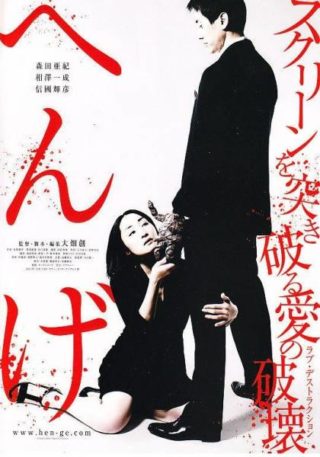 Fun old-school monster movie madness from Japan. Clocking in at just 54 minutes, the film is gory, audacious and romantic (and not in an ironic or insincere way), and can’t be faulted for being too long.
Fun old-school monster movie madness from Japan. Clocking in at just 54 minutes, the film is gory, audacious and romantic (and not in an ironic or insincere way), and can’t be faulted for being too long.
Hajime Ohata, the writer-director-editor of 2011’s METAMORPHOSIS (HENGE), is an up-and-coming Japanese filmmaker who made this film on an absurdly low budget. It screened at several fantastic film festivals throughout 2012, paired with Ohata’s 2008 short THE BIG GUN. Here’s hoping METAMORPHOSIS (with or without THE BIG GUN) will attain some kind of significant U.S. release in the coming months!
Yoshiaki finds himself undergoing horrific convulsions and sprouting monstrous growths on one of his arms. His wife Keiko is understandably freaked out, especially since her husband seems to be growing increasingly inhuman.
Keiko contacts a shrink. After witnessing one of Yoshiaki’s freak-outs the mild-mannered shrink contacts the authorities. The following night several cops appear at Yoshiaki’s house and drag him away, leaving Keiko alone. It’s not long, however, before Yoshiaki escapes from police custody, leaving behind a bloody mess.
Yoshiaki makes his way back home and the love-torn Keiko takes him in. Unfortunately Yoshiaki’s monstrousness has only grown more pronounced; now during his convulsions he grows a mouthful of fangs, which he uses to cannibalize a young woman summoned by Keiko to exorcise Yoshiaki’s demons.
Realizing she can’t stop or control Yoshiaki’s metamorphosis, Keiko lures unsuspecting men to their house for her husband to devour. During the day he retains his human form, at least until some prying cops harass Keiko, which causes Yoshiaki to go into full-fledged monster mode with downright apocalyptic results.
This film has its share of problems—the ultra-low budget, for starters, is obnoxiously evident throughout—but director Hajime Ohata deserves credit for his commitment to old-fashioned in-camera special effects. The latex creature the protagonist becomes isn’t entirely convincing, but a refreshing sight nonetheless in today’s horror landscape, with its over-reliance on CGI. Ohata’s charming old school aesthetic extends to the GODZILLA inspired denouement, in which model buildings are destroyed with gleeful abandon.
The film’s real surprise is its emphasis on characterization and the power of love. Keiko’s affection for her husband feels genuine, rendering the gruesome happenings of the final third less implausible than might be expected. The outrageous final scenes, on the other hand, are played strictly for laughs, and the mix of gross-out horror, pathos and camp works surprisingly well.
Vital Statistics
METAMORPHOSIS (HENGE)
Omni Production
Director/Screenplay/Editing: Hajime Ohata
Producers: Shin’suke Fujioka, Ai Nagura
Cinematography: Hidetoshi Shinomiya
Cast: Kazunari Aizawa, Aki Morita, Teruhiko Nobukuni
